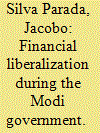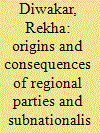|
|
|
Sort Order |
|
|
|
Items / Page
|
|
|
|
|
|
|
| Srl | Item |
| 1 |
ID:
178564


|
|
|
|
|
| Summary/Abstract |
Financial liberalization has been a gradual, calibrated and uneven process in India. Since the early 90s, Indian financial system has been transformed in accordance with a market-led economic strategy aiming to attract foreign investments and prepare its integration into the international financial circuits, through institutional changes, regulatory easing, public monopolies ending, etc. A few years after the 2008 global financial crisis, during the Modi government, the financial liberalization process has been significantly renovated and reinforced. In addition, old and new challenges have been (re)emerged, and domestic and external factors also have had considerable impacts by unveiling and aggravating systemic fragilities. In this context, the objective of this article is to analyze the financial deregulation process and its political and economic implications for India in the course of Modi’s first government, in view of the foreign investments, the banking system, the insurance sector and the monetary policy.
|
|
|
|
|
|
|
|
|
|
|
|
|
|
|
|
| 2 |
ID:
178563


|
|
|
|
|
| Summary/Abstract |
At the United Nations Framework Convention on Climate Change negoti- ations, India has repeatedly pushed for urgent international action on climate change, while simultaneously refusing to limit its own emissions, frustrating other participating countries. The extant economic and strategic interest-based expla- nations do not sufficiently explain some key anomalies in India’s international climate policy and have justified such contradictions in India’s diplomatic dis- course as realpolitik or pragmatic diplomacy. We argue that in order to facilitate India’s meaningful participation in the international climate change regime, we need to engage with these contradictions and understand India’s aspirations for moral and material leadership that stem from the complex interaction between economic and strategic interests and ideational factors. We posit that India’s anti-colonial discourse that repudiated Western materialism, along with its de- sire to be a moral power in global politics coupled with its desire to mimic the western standard of living, creates a development dilemma for India’s postcolo- nial identity in the global climate change regime. India’s continuous attempt to resolve this dilemma has produced specific frames–projecting itself as a victim, mistrust of the West, framing the Earth’s CO2 carrying capacity as extended sovereign territory, and national exceptionalism–in the climate change discourse. These frames are consistent with India’s broader foreign policy discourse as a postcolonial nation and have coalesced India’s claim to moral leadership, seek commitments from developed countries to do their part, and simultaneously play- ing a limited role in the international climate regime.
|
|
|
|
|
|
|
|
|
|
|
|
|
|
|
|
| 3 |
ID:
178566


|
|
|
|
|
| Summary/Abstract |
This article explores the origins and consequences of India’s regional parties and subnationalism, focusing and expanding on the key arguments made by Prerna Singh and Adam Ziegfeld in their books. According to Singh, when political leaders promote an inclusive form of subnationalism, it creates a feeling of cohesive solidarity across the region, which helps to achieve superior social welfare outcomes in the Indian states. Ziegfeld provides an elite-centered explanation for the emergence and success of India’s regional parties, and considers Indian politics to be dominated by clientelistic relationships between parties and voters, which leads to delivery of particularistic rather than public goods. The article also discusses two key themes emerging from the books relating to the importance of subnational versus national identity, and the significance of interests versus ideas in shaping Indian politics and public policy. Finally, it identifies future areas for research on regional parties and subnationalism in India.
|
|
|
|
|
|
|
|
|
|
|
|
|
|
|
|
|
|
|
|
|